#critical discourse analysis
Explore tagged Tumblr posts
Text


Today I decided to learn SFL and CDA because my work climate is not fun 🤕
#sfl#studyblr#academia#dark academia#critical linguistics#critical discourse analysis#fairclough#wodak#halliday#livinthebookshelf#the tortured poets department#thank you aimee
29 notes
·
View notes
Text
The Epistemology of Algorithmic Bias Detection: A Multidisciplinary Exploration at the Intersection of Linguistics, Philosophy, and Artificial Intelligence
We live in an increasingly data-driven world, where algorithms permeate nearly every facet of our existence, from the mundane suggestions of online retailers and products to the critical decisions impacting healthcare and justice systems. Photo by Tara Winstead on Pexels.com These algorithms, while often presented as objective and impartial, are inherently products of human design and the data…

View On WordPress
#Algorithm#algorithm design#algorithmic bias#Artificial Intelligence#bias#confirmation bias#critical discourse analysis#critical reflection#data bias#dataset#Deep Learning#deontology#epistemology#epistēmē#ethical principles#fairness#inequality#interdisciplinary collaboration#justice#Language#linguistics#Machine Learning#natural language processing#objectivity#Philosophy#pragmatics#prohairesis#Raffaello Palandri#sampling bias#Sapir-Whorf hypothesis
1 note
·
View note
Text
What Is Critical Discourse Analysis?
Critical discourse analysis (CDA) is an interdisciplinary approach to studying language in relation to power and social issues. It examines how discourse (spoken and written communication) reflects, reinforces, or challenges social structures, power relationships, and ideologies. CDA researchers take an explicit position, wanting to understand, expose, and ultimately resist social inequality.
CDA goes beyond simply analyzing the words themselves; it also looks at the context in which the language is used. This includes things like the speaker’s and audience’s social identities, the historical and cultural background, and the broader power structures at play.
CDA recognizes that language use, discourse, verbal interaction, and communication belong to the micro-level of the social order, while power, dominance, and inequality between social groups are terms that belong to a macro-level of analysis. One of the tasks of CDA is to bridge this micro-macro gap.
For example, CDA might study how the structure of a racist speech in parliament (micro) contributes to the reproduction of racism in society (macro).
There are a number of characteristics of CDA research, including:
Power dynamics: Instead of just looking at the words and grammar, CDA tries to understand how power dynamics shape the way we use language. CDA is inspired by philosopher Michel Foucault, who argued that language reflects how power is used in society.
Social problems: CDA researchers are interested in how language plays a role in social issues like discrimination, inequality, and abuse of power. For example, CDA might look at how politicians use language to divide people or how the media portrays certain groups in a negative light.
Context of language: To understand a text or conversation, CDA takes into account the social, historical, and cultural background. Imagine trying to understand a joke from a hundred years ago – you would need to know about the culture and events of that time to get it.
Practical relevance: CDA is not just about analyzing language for the sake of it. Researchers want their findings to be useful in addressing real-world problems. For example, CDA research could help develop strategies to combat hate speech or promote ore inclusive language.
Critical and questioning: CDA researchers take a critical stance, questioning assumptions about language and power. They are skeptical of claims that language is neutral and objective. Instead, they see language as a tool that can be used to reinforce or challenge power structures.

0 notes
Text
You know a character is overhated when people have to make up shit that didn't happen on order to justify that hatred.
"Caitlyn gassed the whole city of Zaun" wrong. She uses the grey as a weapon to incapacitate the chembarons in their hideouts, specifically. The montage SHOWS us this. She does this in a strike team she creates as a means to avoid an all out invasion led by the Noxian forces, which would have meant the deaths of several innocents. Even if the grey might have spread minutely to affect civilians, the chances are slim, and the grey is nothing more than factory smaug. Objectively, a handful of civilians breathing factory smaug for a brief amount of time is worlds better than numerous innocent people dying. Even in her rage, Caitlyn knows mercy.
And I guess these same people falsely overstating Caitlyn's actions don't want to talk about Jinx using gas bombs indiscriminately on the entirety of Piltover, intentionally harming innocent civilians. Or that her fishbones blast ALSO killed innocents.
No, I guess we only want to talk about the intentional harming of innocent people if it's Caitlyn doing it, and you have to outright lie about her intentions and the severity of which she acts in order to do so.
And the thing is, when you do shit like this, it makes it impossible to talk about other characters, like Jinx, their faults, their good and bad, without then making others assume that their character deserves hate the way you hate Caitlyn. I love Jinx. She's a fantastically written character. But I call out her actions and the way she harms others and you assume I'm calling her a bad character undeserving of an audience's love, right? The way you are with Caitlyn?
Arcane is supposed to be a show where we're able to discuss the spectrum of morality. And it's actually done phenomenally well, but people like you want to look at things in a very black and white way. You're looking at it on a class based system. If someone is from Piltover, no good deeds they do can be considered if they do something bad. If they're from Zaun, every evil thing they do must be defended in some way. Because privilege and oppression are the ultimate markers of good and evil to you. There's no complexity to be had there for you. People of privilege can't feel pain. Oppressed people can't cause pain.
It's narrow minded.
I love Arcane because we CAN discuss this complexity that exists. And I guess it makes sense why you hate season 2, because it made it impossible for you to stay with your narrow minded way of thinking.
#arcane#caitlyn kiramman#jinx#arcane jinx#jinx arcane#caitlyn arcane#arcane caitlyn#arcane league of legends#arcane analysis#arcane discussion#arcane discourse#fandom critical
441 notes
·
View notes
Text
Just saw a "feminist" video essay (by someone who just happens to only talk about feminism in relation to cishet white able bodied women) say that the Hays Code was good for women because it "prevented them from sexualizing women by preventing onscreen depictions of sex". Never before has a video said something that made me vocalize my disgust of it's takes, but this did it.
I didn't think I would have to say this but if you defend the Hays code you are horrible and not in any way progressive. And if you don't know what it is please look it up because it's probably the most important piece of history when it comes to all media analysis in the western world.
#196#my thougts#leftist#leftism#feminist#feminism#queer#media criticism#media literacy#media analysis#the internet#social commentary#discourse#proship#fuck antishippers#hays code#film history#cinema#white feminism
620 notes
·
View notes
Text
From Student to Staff: The Adults Who Watched Him Break, Then Welcomed Him Back
Severus Snape didn’t just return to Hogwarts as a professor. He returned to a castle full of ghosts—not the ones who drifted through walls, but the ones who once looked through him. The ones who had titles, robes, and responsibilities. And Merlin, the way they smiled when he came back.
These weren’t strangers. These were his former teachers. The ones who watched him unravel—slowly, painfully, obviously. They saw the weight—emotional bruises no child his age should have been burdened with. They noticed the robes that hung too loose, the way his voice softened into nothing, the eyes that dulled year by year. And then, as if memory had been Obliviated, they greeted him with polite nods and teacups.
Let’s name them. Let’s drag the velvet curtain back. Let’s ask what they refused to.
🧙♂️ Albus Dumbledore — The Grand Strategist of Silence
He saw everything. The twinkle in his eye? That was calculation. Dumbledore knew Severus’ pain. Knew his background. Knew the Marauders were brutal, and knew exactly how Hogwarts worked for boys who didn’t shine the right way.
And what did he do? Nothing.
Not until the prophecy.
Not until Severus—broken and desperate—came crawling with regret.
Only then did Dumbledore offer protection. And even then, it wasn’t mercy. It was strategy. It was cost-benefit arithmetic.
He kept Severus close, yes—but not out of trust. Out of necessity. And in that same chessboard logic, he raised Harry the same way. A pawn to be protected, yes, but only until it was time to be sacrificed.
Severus recognised it all too well. The same cold detachment Dumbledore had shown him as a man—keeping him close, not out of care, but for utility—was now being applied to Harry. Despite the tangled mess of resentment and reluctant protection he felt toward the boy—born of Lily, shaped by James—Severus could see the pattern. He could see the purpose.
He saw through it: "You've kept him alive so that he can die at the proper moment. You've been raising him like a pig for slaughter!"
Two lives. One broken young, the other burdened late. Both groomed to serve, both shaped for sacrifice—and in the end, perhaps, both meant to die on cue.
And when the war ended, Dumbledore offered Severus a position—not because he sought to make amends, but because it served a purpose. Severus had returned to spy, initially under orders, a reluctant shadow caught between masters. And once the mask was worn long enough, Dumbledore simply let it stay.
As if a professorship could heal years of sanctioned cruelty. As if being called "Professor" would cleanse the memory of being a punchline in the corridor.
⸻
🧪 Horace Slughorn — The Collector of Potential
He loved talent. But only when it glittered.
Slughorn praised Severus’ brilliance in Potions—called him promising, sharp. But he never once shielded him.
He didn’t invite him to the Slug Club. Not until Severus’ name meant something. Not until his mind could decorate a shelf.
Slughorn’s affection was conditional. You had to be charming. Presentable. A legacy. And Severus? He was none of those things. Just a poor boy with a hungry mind and no surname to flaunt.
And perhaps that is why, years later, Severus held nothing but quiet disdain for him. Because if anyone should have noticed what was happening in the shadows of Slytherin House, it should have been its Head. Not McGonagall. Not Dumbledore. Slughorn.
He should have seen it first. And yet—he didn’t.
Slughorn used him on parchment, but never sat beside him in reality.
⸻
🐈⬛ Minerva McGonagall — Sharp-Eyed and Selectively Blind
Minerva loved her lions. James Potter was golden in her eyes—brave, brilliant, bold.
She watched him torment Severus in broad daylight. She called it mischief. At best, she scolded. At worst, she said nothing.
She taught Severus Transfiguration. She saw his talent. But she never once stepped in when he was dangling upside down in a public corridor.
And years later? She called him Severus. Perhaps it was meant as respect. Perhaps it was all she had left to give. But even that name, spoken in her steady voice, must have tasted hollow.
Because if I were Severus, I don’t know what I would feel beneath the careful nods and professional courtesy. Not really.
Respect? Yes. She was formidable, fair—in her own way. But also a bystander. A witness to pain who never raised her wand.
The bitterness would have settled in strange places. Not hatred. Not fury. Just that sharp ache that lingers when someone could have helped—and chose not to.
As if calling him by name could erase the silence that came before it.
⸻
📚 Filius Flitwick — Gentle, Brilliant, Absent
Flitwick was kind. Clever. Charms master of immense skill. The sort of professor whose praise felt like sunlight.
And yet—he kept to his corner. He didn’t speak up.
Severus wasn’t just a good student. He was exceptional. The sort of student whose talent should have lit up the classroom like a Lumos Maxima—quiet, focused, effortlessly precise. The kind of brilliance that doesn’t need to shout because it radiates.
He invented spells. Created incantations from scratch. If anyone in Charms class should’ve stood out like a blinking sign under a spotlight—radiating silent brilliance from the back of the room—it was him. You didn’t need him to speak to notice. You just had to be looking.
Surely Flitwick noticed. How could he not?
But maybe noticing brilliance wasn’t the same as seeing pain. Maybe house loyalty got in the way. Maybe the politics of Slytherin versus Gryffindor made it easier to stay silent.
Perhaps he thought it wasn’t his place. Perhaps no one ever taught the professors how to reach past a student's wandwork and into their wounds.
And so, in the silence between spells, a boy learned that even kindness could be hollow.
⸻
🌿 Pomona Sprout — The Kind Bystander
Warm, earthy, nurturing. That was Sprout’s image. A Hufflepuff’s dream.
But she, too, looked away.
Maybe she frowned at what she saw. Maybe she clucked disapproval over tea. But she never interrupted the hierarchy.
Not when Severus slouched through corridors like a shadow. Not when he withered a little more each autumn.
She believed in fairness—but not enough to fight for it.
⸻
🏥 Madam Pomfrey — The Healer Who Didn’t See
Out of all the professors, Madam Pomfrey may be the one I find myself most curious about. Not because she was cruel—she wasn’t. Not because she was blind—she couldn’t have been. But because if anyone should have noticed—it was her.
She could spot a fractured rib with a glance. She healed Quidditch injuries between spoonfuls of broth. Her hands were warm, her wards comforting.
And yet… she didn’t notice Severus returning each term thinner, paler, greyer?
No trace of curiosity when he flinched at loud spells? No quiet pause when he walked too carefully, too lightly—as if even the castle floors might punish him?
Did she not see the hex marks? The magical burns? Did she really miss the boy who never sought help unless he was near collapse?
Or perhaps... he hid it too well. Perhaps he wore silence like a second robe. Perhaps he'd already learned that pain, when visible, only made you more vulnerable. That vulnerability made you expendable.
But still—she was a healer. She would have known the signs. Malnutrition. Exhaustion. The long-term magical residue that clings to a child who’s been hexed too often.
Pomfrey, as matron, was in a position to notice it all—if he had come to her. But maybe he didn’t. Maybe he couldn’t. Maybe he knew better than to hope.
We know his home life wasn’t gentle. Tobias Snape, his father, was a drunk—furious, unkind, loud enough to silence the whole house. We weren’t shown every bruise or every scream, but we were shown the aftermath.
So when Severus came back each September—robes loose, eyes dimmed, voice flat—surely, surely she must have seen something. Anything. A flicker of concern. A whisper of doubt.
To be fair, we cannot fully blame her. Hundreds of students passed through her care. She healed what was asked, tended what was brought. Perhaps she was simply overwhelmed. Perhaps she assumed someone else would act.
But still… I can’t help but wonder.
She offered pepperup potions to those with sniffles. She wrapped bandages around bruised Gryffindors.
But Severus? The boy who never asked, who needed most?
She offered rest to others.
But not to him.
⸻
They all had eyes. They all had wands. They all had duty—but they wore it like a decorative cloak, not a vow.
And oh, how one wonders. How could they not see the bruises? The shoulders pulled too tight? The voice too low?
How could a castle brimming with portraits, portraits that whispered and staircases that listened, miss the slow crumbling of a child?
Perhaps they did see. Perhaps that’s what makes it worse.
Because silence isn’t always ignorance. Sometimes, it’s a choice. Sometimes, it’s self-preservation masquerading as neutrality. Sometimes, it’s indifference dressed as decorum.
And still—they looked away.
Severus Snape returned to Hogwarts as a man.
But once, he was the boy they failed.
And they seated him at their table as if none of it ever happened.
#severus snape#snape meta#hogwarts meta#hogwarts professors#harry potter analysis#harry potter meta#pro snape#pro severus#hp fandom critique#canon discourse#character study#the boy who was never saved#wizarding world politics#anti marauders#dumbledore critical#slughorn critical#marauders era analysis#severus snape deserved better#snape fandom#fanned and flawless
120 notes
·
View notes
Text
It’s really funny how much people misremember certain aspects of ATLA and then proclaim to the internet stuff that either never happened or is extremely distorted with absolute certainty. For example, today I saw a person claiming that whole point of Katara’s character arc was unlearning the parentified behaviours she developed in wake of her mother’s death. That a huge part of Katara’s arc was a confrontation of how that trauma fundamentally shaped her maternal tendencies.
The thing is though…WE the audience, can recognize that the parentification Katara experienced was something that was really straining for her, but the TEXT doesn’t. The audience (or at least certain parts of the audience) can identify that her maternal tendencies were indicative of a responsibility that she took on far too young and subjected her to unnecessary pressure and stress. There are flashes of recognition maybe, but for the most part, the show doesn’t actually confront the negative impact that Katara’s maternal role had on her.
Katara never truly unlearns the maternal behaviours that put so much pressure on her because the text doesn’t see it as a bad thing. Arguably, the text doesn’t see much of a problem with the emotional labour Katara takes on and how that labour goes unreciprocated for the most part (particularly from her canon love interest). We see some reflections, but it’s not enough to support a reading of the text where that element is actually extremely obvious and a prominent point in her character arc.
We’re not the ones “watching the show with our eyes closed”, I think you’re just misremembering the canon progression of Katara’s arc to avoid confronting a real issue in the text.
#Katara#pro katara#avatar the last airbender#atla fandom critical#atla discourse#the gaang#character analysis#atla fandom discourse#zutara#atla critical#anti bryke
503 notes
·
View notes
Text
you know, something that bothers me supremely about the scene where caitlyn hits vi and leaves is the imagery, and (i personally) haven't seen it discussed yet
so i'd just like to point out that caitlyn hits her with the butt of her rifle that she uses for police work (and has a similar design to what other enforcers have been seen carrying) while in uniform: the way this scene was written is bound to evoke associations of police brutality and the systemic oppression that has already been shown in arcane.
imo that just makes the whole scene worse by highlighting the power imbalance between vi and caitlyn. it's a big reminder to the viewer that we're seeing a cop that operates within a body that specifically and intentionally oppresses the lower class hitting a lower-class woman with the weapon (not tool, weapon) that we know they used to intimidate and keep them "in line" in the past
i'm not going anywhere specific with this, just wanted to know what other people thought !!
(and yes, i know vi was also in uniform, but that just points out the working imbalance of cait being her commanding officer, aka her boss; similarly i used "that woman" instead of girlfriend as to not bring in the dv undertone— and neither of these erase the socioeconomic divide between them, arguably it just makes it worse)
#arcane critical#arcane criticism#arcane discussion#arcane discourse#caitlyn critical#caitvi critical#arcane analysis#arcane#arcane season 2#arcane s2#vi arcane#caitlyn kiramman
63 notes
·
View notes
Text
"Eddie said he's straight! Buck said Eddie was straight! Buck said he's not in love with his best friend! They shut down Buddie in the show it isn't happening ya'll are delusional! Queerbait! Queerbait! Blah blah blah"
I feel like I'm going insane. I'm sure we're all tired of people shouting "media literacy" every five seconds, but like... Yeah, develop some media literacy, please.
I'm saying this as someone who doesn't usually like romance, despite being subjected to it in basically every piece of media. As someone who doesn't generally look for love stories. As someone who loved Buddie but didn't consider any serious possibility of it becoming canon before season 7/8, who refused to believe Buddie was truly happening until I couldn't deny it anymore: this episode is loud.
Please understand how narrative arcs work. How character arcs work. How character development works. How serial broadcast television works. Understand how writing works. Consider context; take the whole episode, the whole season, and the whole series into account instead of treating things like they exist in isolation.
I'm too tired to go through the step-by-step details of the episode to prove why these, "they said it on screen, therefore..." takes are shortsighted and ignorant; plenty of people have done that already.
But that episode, even if we do take it in isolation, is textbook. Do people really take everything characters say at face value? Do people not watch other character's reactions? Listen to what else is being said? Watch what is being shown? Consider the implications? Themes? Narrative devices?
Consider that maybe, just maybe, characters can be unreliable narrators, or believe something to be true only for that belief to change later. These things don't happen in one episode. There's such a thing as set-up, foreshadowing, the starting point of a plot. 911 is a serial drama, therefore it is going to have A) long-form story and character arcs, and B) drama.
Characters are not going to move in straight lines, or talk in therapy speak, or solve every problem in an hour. They are not always going to be right, or self-aware, or truthful, or rational. Direct dialogue does not equate to honest dialogue.
Also, saying, "well in real life, people do this, I do that, their feelings would be this, yadda yadda yadda" means nothing. Your experiences are not universal, and more importantly, this is a work of fiction. Realism is whatever the story says it is; it's going to do whatever creates the most dramatic, interesting, developmentally beneficial, or emotionally satisfying story. Whether you like that story or not is irrelevant to the fact that stories are not going to cater to all your expectations or real-world experiences.
To people pointing to Tim or the actor's interviews as "proof" they're shutting down Buddie: again, please understand how broadcast television works. They are not going to tell us everything that's going to happen before it happens. They are going to play the neutral zone, the "wait and see," the "will they/won't they." They are going to lie. That is television production 101. You can compare what they've said in the past with canon and list all the contradictions, misdirection, and twists you didn't see coming because they didn't spoil it for you. Watch the show. That is the canon.
They're also not catering to fandom--people they already know are devoted to the show, familiar with Buddie, and consistently tuning in. They're introducing the idea of Buddie to the general audience, people who likely haven't considered the possibility before. The GA has to see that Buddie is an option, so the show needs to manifest it as if it's a brand new concept. This episode pulled the pin on that grenade in a very obvious way; the idea that Buck could be in love with Eddie and that Eddie could not be straight has been planted. The next seed will be Eddie's feelings. Now the show needs to water it and let it grow.
One last thing. Been seeing a fair amount of hand-wringing and condescension over people interpreting this episode differently. As if this is some sort of "gotcha" for bad writing, baiting, or people being stupid. Listen, genuine complaints about this show's writing aside, different interpretations or inferences are completely normal. This isn't unique. That is how people interact with stories, through personal biases, experiences, emotions, and expectations. That isn't inherently a bad thing. It's totally fine to have your own views; media is all about interpretation.
However, it is also true that just because you have an interpretation, that doesn't make it true. Not all interpretations are equal in their validity, evidence, or warrants. The show has an intention, it has a story in mind. If you don't see it, sure, that could be a failure of the writing, but it could also very well be a failure of your analysis, especially when the show hasn't finished telling the story. Looking at one thing in isolation and forming your whole conclusion based around that makes for poor critique.
I guess we'll just have to wait and see who's right.
#911#911 abc#911 spoilers#buddie#ramblings#911 discourse#I guess#I usually keep my mouth shut in this fandom but I am exhausted#i am not working through a degree in narrative writing and media literacy to watch people fail this badly at critical analysis#also hate people shouting “queerbait” going “well as a *fandom elder* who survived destiel/sterek/johnlock/etc.” or whatever#bruh I grew up on that shit too please just shut uuuuuup#like be honest those weren't going to happen and it was obvious from watching the shows (not that ships need to be canon anyways)#I know queerbaiting is traumatizing but you have got to stop throwing that word around so casually and before the story is even finished#this is a whole different show with several established queer characters in a different era of television#the fact buddie is a big open topic of media discussion now is also huge--it's being established in the minds of the public#and yeah yeah “they're baiting” but do you not see how in this day and age queerbaiting would effectively be career suicide?#also they aren't relying on shippers to keep their ratings afloat#if they weren't going to do buddie they wouldn't keep leaving the question open-ended it's a catch-22 at this point#i know pessimism is all the rage but i'm begging you to try optimism and good-faith and maybe some positivism
96 notes
·
View notes
Text
youtube
"The writers have talked about how important it is not to be an asshole when you're criticizing something, which i think is something most people agree with"--Hbomberguy, in his RWBY video.
Lets determine whether he counts himself among those "most".
No pressure to watch this one. I know the discourse around this sucks
#rwby#youtube#be kind#good faith#bad faith criticism#good faith criticism#bad faith#media analysis#media criticism#media literacy#hbomberguy#rwby fndm#fndm#discourse#monty oum#kerry shawcross#miles luna#crwby#adam taurus#white fang#ruby rose#weiss schnee#greenlight volume 10#yang xiao long#blake belladonna#ughhhh#Youtube
57 notes
·
View notes
Text
Scholarship can make a significant contribution to enlightenment, yet ‘scholarship’ needs to take a stance and express itself in comprehensible ways, in many different public spheres and via different genres of text and talk.
Ruth Wodak (Interviewed by Andreas Schulz)
#academia#scholarship#discourse#discourse analysis#critical discourse analysis#sociolinguistics#academics#critical linguistics#dark academia
2 notes
·
View notes
Text
i think quite a few people saying that exu divergence is a bad look after c3 are missing the point a little bit.
first of all: if c3 just wasn’t the type of story you like, that is so fine! it was very high stakes for my tastes, even if i did enjoy it! you can not like something without it being bad! that is how media works. the rest of this goes under the cut for those avoiding discourse
second: yes, c3 was messy, but that was the point! there’s no good answer to “an evil wizard wants to unleash a godeater, and now that he’s opened that door there is no closing it, and if he dies, eventually, now or in a hundred years, someone will replace him, so how are you going to fix it?”
the gang found an answer to the problem that maybe wasn’t the best, definitely wasn’t “””right””” because this isn’t black and white, but that got rid of the predathos problem, took the evil wizard’s control of the situation away, and let the people of faith keep their gods instead of removing them from the world entirely, which is a very cool answer to the issue! maybe its not what everyone wanted to happen, but it is a very creative solution, which is fun and which dnd games lend themselves to.
the point of c3, as i see it, is examining the consequences of a world that the gods have left. it’s been a THOUSAND years since divergence at this point. the gods, while they do act through their people and talk to people, are largely inaccessible to the common folk. and that’s what c3 is all about. the consequences of the gods being gone, shown through a largely non-religious party.
divergence is all about the consequences of the gods being right there, too present and too big and causing trouble and enacting miracles.
of COURSE we see the moonweaver be soft and sisterly and loving in such an overt way in divergence. she’s spent the last couple decades being loved as a mortal sister, loved just for living and loving in return.
and of course in c3 we see them vaguely disconnected and unawares of some suffering on exandria and people committing horrors in their names, primes and betrayers alike. if you got ripped away from your children for a thousand years and could only watch through a looking glass and occasionally talk to a few of them in dreams and visions and cryptic messages? you’d have to stop caring a little too, just to keep going!
the gods were so withdrawn for so long, that has to have consequences. it did. that was all of c3.
bells hells DID speak for the people. people who hadn’t had gods around for a millennia, who get overlooked as collateral in a war about gods, again. they’re not heroes. they’re a bunch of idiots all desperate for a family, who mostly cared if they could save each other, in the end, but who wanted to save others on the way if they could. they’re the people that the divergence gang would grow to be, with power and a smidge of a voice, just minus the real attachment to any gods.
there are so many parallels i could draw between garen and chetney, between the roaches and ashton, nia and fcg. divergence isn’t highlighting a failure on c3’s part. it’s showing the opposite end of the spectrum. distant gods vs overly present gods.
#critical role discourse#discourse#bells hells#cr3#critical role#exu divergence#listen im just putting on my media analysis hat#i get if the story of c3 just isn’t your speed but it WAS NOT INHERENTLY BAD CAUSE YOU DONT LIKE IT#cr
81 notes
·
View notes
Text
People love silco because they love jinx, and silco refused to give jinx up.
But he never, not once, felt remorse for the way he destroyed his own city via drug cartel, child labor, reckless violence, police bribery, etc. He was an evil character who had love for his daughter. That is his one redeeming quality and it does not make up for the bad things he did.
The same people hate caitlyn because she made terrible decisions due to a lapse in judgement influenced by multiple factors, harming Vi and Zaunite citizens.
But she consistently felt remorse and was conflicted with the person she became. She constantly questioned Ambessa and her motives, and tried to minimize the damage she did, though it took her a while to fully release the anger that influenced the damage she did, and accept she would have to spend a lifetime making up for it. She is a good character who did terrible things and committed herself to rectifying them.
See the difference?
#no i dont imagine the people who need to see this can see the difference#this will fall on deaf ears but im putting it out in the world anyway#arcane#caitlyn kiramman#silco arcane#arcane silco#caitlyn arcane#arcane discussion#arcane discourse#arcane analysis#fandom critical#jinx#arcane jinx#jinx arcane
277 notes
·
View notes
Text
The Infamous "Durge Is a Man" Essay
I - INTRODUCTION
There's one simple question that led us to developing this theory: "would Bhaal want a female heir?"
Bhaal created Durge to be his ideal successor: the hand who would've reaped death in the world, conquering it in His name.
Every detail we get about Durge's lore is tied to this objective, the entire purpose of Bhaal's creation.
The cult is obviously shown to us as patriarchal, which is hinted at from the sole fact they worship a male deity: the argument may come off as silly at first, since one could argue Gods do not understand nor care for the concepts of gender.
It would be a valid counterpoint, if it wasn't for the fact Bhaal used to be a human, having navigated the world as a fully grown man before he eventually became a God.
If we believe he created Durge in his ideal image, it seems much more intuitive for his offspring to be male.
II - THE MATTER OF SUCCESSION
We must note that Bhaal's plans heavily rely (as we can read in Durge's "diary" tab) on reproduction ; e.g "siring lots of Bhaalspawn".
This alone isn't coded as one sex or the other but, if we think of it in terms of convenience, a female heir wouldn't be your first choice for the task: women can only gestate one child per year and conceive in very specific windows of time within their cycle, while men can potentially impregnate countless women in the same time span and not suffer any physical disadvantages during gestation.
We should also consider women tend to develop a bond with their newborn and the latter needs to rely on them for survival during the first few months of their life, while a man:
1. has no such obligations from a social point view (especially in a medieval context, where bastard children were the norm)
2. isn't strictly needed by the child for survival, biologically speaking.
I doubt Bhaal was expecting his heir to keep track of her cycle, gestate for nine months with all the drawbacks that come with it, give birth risking death and spend the following months caring for a newborn – all of this, on repeat for years if not centuries.
"But he's a God, he could potentially speed up the process!"
Technically true, but why would he go through such trouble, if he could craft his ideal child as a male and avoid complications?
The game itself seems to agree with this theory, since you get the "Bhaal's stallion" line regardless of your Durge's gender, in one of the bad endings.
We could also consider the idea that reproduction = power, "spreeding the seed", to be a typically patriarchal concept.
Bhaal himself isn't fond of the idea of raising children, as he let Durge be raised by an adoptive family – a "regular" one no less, meaning he didn't even concern himself with choosing one.
III - IN-UNIVERSE MYSOGINY
There are many aspects of the religion that seem to glorify manhood, and for its leader to be a woman (by Bhaal's choice, no less) seems inconsistent.
Let's think of the infamous blessing granted to Bhaal's favourites, the Ecstasy of Murder, which basically consists in a pseudo prostatic orgasm.
Then we consider the presence of predominantly-male sexual crimes, both coming from Durge and other important figures within the cult.
We cannot deny necrophilia, for functional reasons, is extremely uncommon amongst women: necrophilic acts are typically carried out by penetrating a dead body, as it's almost the only pleasurable act you can perform on a corpse ; Durge being a known necrophiliac pre-lobotomy could be one of the many hints the character is meant to be read as male.
Not to mention the horrendous way in which Bhaalist female characters are treated in-universe, between Sarevok sexually abusing his daughter (and this concept being treated as completely normal by the narrative, as far as we know of) and Orin being constantly belittled.
We never hear of any male cultists undergoing the same treatment, meaning abusing women is the norm amongst Bhaal's faithful – yet again, a telltale sign of a patriarchal religion.
"But Orin isn't mistreated because of her sex, she's mistreated because she's not the true heir!"
Orin is, indeed, not Bhaal's biological daughter: she's related to Him by blood, but as Durge himself says, her blood is "diluted".
However, while he acknowledges she's not his biological sister, he still addresses her as such in multiple sources, meaning the cult leader himself doesn't care about her actual origins.
She's constantly portrayed as someone who gets talked down to, cast aside and her beliefs are harshly criticized both by Durge and others influential members such as Sarevok.
For Larian to choose a woman to fill this role could have been accidental, but we must admit the symbolism is quite clear.
Orin interprets murder as a form of art, while her Bhaalist peers frequently accuse of her misunderstanding her own faith, considering her too immature to lead the flock.
She's the only Bhaalist female character we're shown as remarkable, and she's coincidentally used as an example of someone the cult does not respect ; she's even biologically related to Bhaal and yet, she had to seize power by force.
IV - ROMANTIC SUBTEXTS
Another interesting matter are the characters commonly paired with Durge in fanworks: Durgetash and Durgestarion are the most popular romantic pairings according to ao3, and we cannot blame the fandom for catching up on the subtext.
Durge's "admiration" (as he calls it himself) towards Gortash is viewed as controversial and arises suspicion in-universe, to the point he feels the need to apologize to his Father and repent for an implicit sin.
While it would be scandalous to fraternize with Gortash even in a platonic matter – he's practically the leader of the rival cult –, the emphasis put on justifying their interactions has been interpreted by fans as romantic subtext.
The letter in which Durge addresses the issue is titled "Letter for Forgiveness", despite Gortash only being mentioned at the beginning, while the rest of the letter focuses on different topics entirely.
Right after expressing guilt for the way he views Gortash, Durge proceeds to repeat Bhaal's plan and promises to follow it, stressing that he would have made his Father proud regardless.
The letter overall comes off as an attempt to justify being attracted to Gortash and reassuring Bhaal that it wouldn't come in the way of their plans, as it would pose an enormous threat otherwise.
Durge being attracted to Gortash – if we choose to interpret him as a man – would come with a handful of important challenges: first of all, sympathizing with the 'enemy', implying Durge could abandon the idea of betraying him or even allow Gortash to do the same to him.
Second of all, being capable of such vulnerability that would come in the way of being a sentient weapon: a killing machine isn't supposed to feel pity, let alone experience something as foolish as forbidden love.
And thirdly, for Bhaal's heir to prefer the company of men is simply a disgrace, as it would come in the way of reproduction and possibly undermine his public image.
While all of this may have not been meant as a homosexual allegory, the fact you can find the Letter for Forgiveness on Durge's corpse if you play as Tav, still comes off as "bringing a secret to the grave".
Not to mention the note at the end of the letter, written by another cultist, reading: "Ha! Orin was right about her sibling." which is clearly a jab at what we mentioned above.
When you go to confront Orin in Act III (as Durge) about the fact she has been following you around town, she replies: "The little lordling has been whispering in your ears? He always knew how to tumble and twist your mind matter, leaving you knotted in his chords."
The matter of Durge's attraction to Gortash is seen as something silly and shameful at the same time: it's an open secret cult members dare to joke about, because they find it ridiculous.
If a hypothetical female heir of Bhaal had the slightest possibility of reproducing with the Chosen of Bane, I'm pretty sure they wouldn't find it as humorous – they find it hilarious because it's taboo, a powerful demigod developing a "school crush" on a male ally.
We should also talk about some of the in-game implications about Gortash, such as being someone who possibly "slept his way to the top": managing to charm and daze a much more powerful man on purpose sounds surprisingly in-character.
What we find even more interesting are the implications that come with Durgestarion, a pairing the writers are openly fond of.
We know both characters were characterized by the same writer, the latter going out of his way to include personalized romance interactions between the two: unlike other characters, romancing Astarion as Durge gives the player access to tons of new dialogue lines and greetings, sometimes making for a completely new experience compared to romancing him with a regular Tav.
Some hints may point to Durge being the "canonical" romance for Astarion, as many fans have speculated ; while one may disagree with that sentiment, we must admit it's not far fetched.
If we consider all of Astarion's canonical past relationships (meaning, the few ones he actually deems important and genuine) were with men, and the emphasis put on Durge's "admiration" towards Gortash + the incessant pressure Bhaal puts on him to reproduce, the thought of these characters romancing each other in an alternative timeline actually sounds liberating.
Some Durge-specific lines Astarion says during his romance arc seem to be aimed at a male character, rather than sounding gender neutral: the first example that comes to mind is "Are you alright now, or is today a 'I will wed you with a delicate veil of blood blooming over your white curls' kind of day?"
Astarion sarcastically references Durge "wedding him", thus putting the player in a stereotipical "groom" role from the start, with the veil resembling the one brides typically wear during the cerimony.
If we consider all other aspects mentioned in this theory, the line reads as somewhat... male-coded.
If we want to be truly insane about this theory – and of course, we do – , we could even add a "gay allegory" element to the equation.
A vampire and the spawn of an evil deity, excluded members of society who'd usually feel a compulsion to hide, are implied to fall in love by the narrative.
V - ACTING CHOICES
Finally, we come to the voice actor: while a specific actor was chosen to play the character and is regarded as the iconic Durge VA, Larian didn't concern themselves with choosing a female voice actor to include the possibility of a female Durge, which is why we can only hear his intro in Neil Roberts' voice.
VI - CONCLUSION
With all of this taken into account, a female Durge seems to be an after-thought, if not directly a fantasy or a headcanon that the game gives you the possibility to play out.
The original narrative, as we can see, best accomodates a male character.
#baldur's gate 3#baldur's gate iii#bg3#bg3 companions#the dark urge#durgetash#durgestarion#bg3 durge#bg3 gortash#enver gortash#orin the red#bg3 orin#larian critical#bg3 discourse#bg3 tav#bg3 astarion#astarion romance#astarion analysis#lord enver gortash#bg3 sarevok#sarevok anchev#tav x astarion#male durge#female durge#chosen of bhaal#bg3 headcanons#bg3 lore#act iii#bg3 act 3#bg3 act 1
129 notes
·
View notes
Text
connie vs catra: falling in love with a hero
so one thing in SPOP that reminded me of SU is when Catra gets upset and angry at Adora for needing to sacrifice herself in order to save the world. something very similar to this happens in SU where Connie gets upset at Steven for turning himself in to the Diamonds, so that he can prevent everyone else from getting hurt.
and i wanted to compare these two scenarios and talk about why this kind of conflict worked with connverse, but not c//a.
1. Past Relationship And Hypocrisy
Connie and Steven had a healthy relationship prior to this incident. Connie was always supportive of Steven and quite honestly, was one of the very few people who had no expectations for him based on his mother.
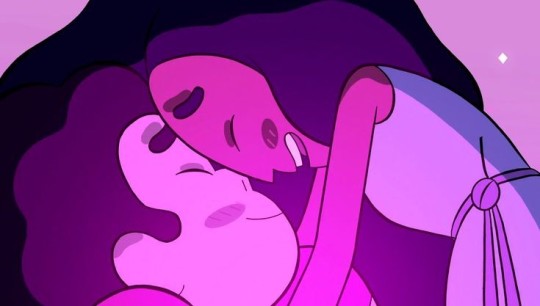
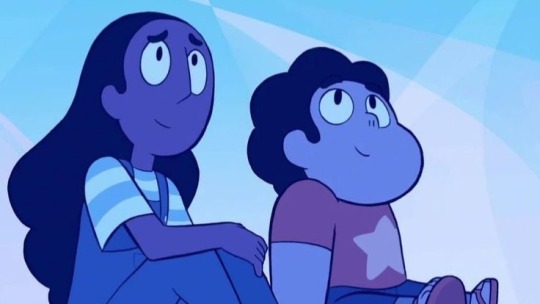
the Crystal Gems constantly talked about Rose and knowingly or unknowingly put pressure on Steven to live up to her image. Greg often mentioned Rose too, and while he may not have intended to make Steven feel pressured, that was the outcome.
Connie, on the other hand, saw Steven for who he was - a 14 year old kid who had way too many expectations to live up to. she served as Steven's rock and his connection to human life, letting him goof off and relax like he should. she listened to him when he was feeling troubled, and assured him that she would always be there to support him. Connie made Steven feel loved and understood.
they also made a promise to always fight together after Pearl tries to pressure Connie into sacrificing herself for Steven. Steven is clearly uncomfortable with this and doesn't want Connie to act like his bodyguard and put herself in danger.
so it makes complete sense that Connie felt hurt and betrayed when Steven decided to do exactly that and sacrifice himself to save her and the rest of beach city. it makes sense that Connie was worried sick about Steven after he surrendered himself.
Connie feeling upset about this situation makes sense because she actually cares about Steven. she always has.
meanwhile Catra constantly used Adora's fears and insecurities against her, even when they were on the same side and especially when they were enemies. Catra made Adora feel worthless for existing, she made Adora feel like a failure.
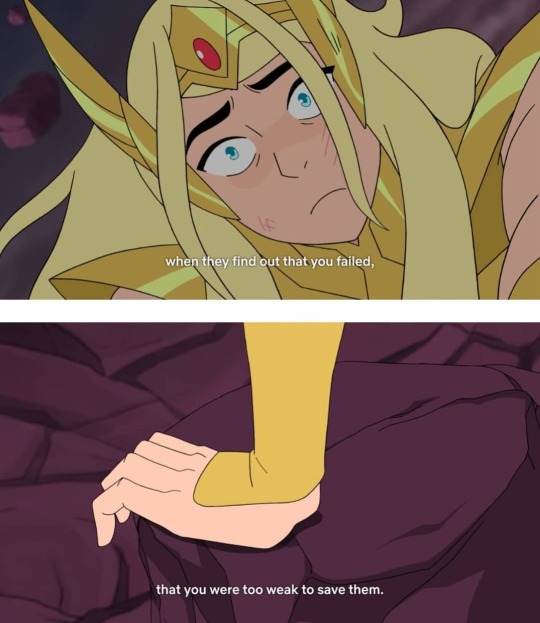
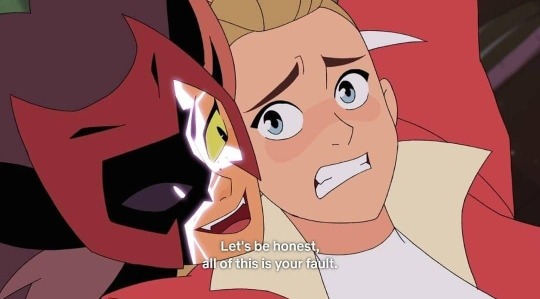
Catra actively and knowingly contributed to Adora's self-sacrificial complex and her habit of putting everyone else's safety above her own. and then she's surprised that Adora wants to sacrifice herself to save the world. wow. who would have thunk it?
Catra has absolutely no right to act like she cares about Adora after all this. and she certainly has no right to get mad at Adora for doing something Catra herself conditioned her to do.
it makes no sense especially because the show acts like the previous seasons never happened. neither Catra nor Adora nor anyone else brings up the fact that Catra was one of the main contributors to Adora's hero complex and her insecurities. the show just glosses over that and acts like Catra being upset about all this is tragic and sympathetic.
2. Expressing Anger In A Healthy Manner
Connie is upset but she communicates her feelings to Steven in a calm manner. she tells him that what he did hurt her feelings. she is obviously angry and upset, but she's also visibly trying to keep it together and not let her anger get the best of her.
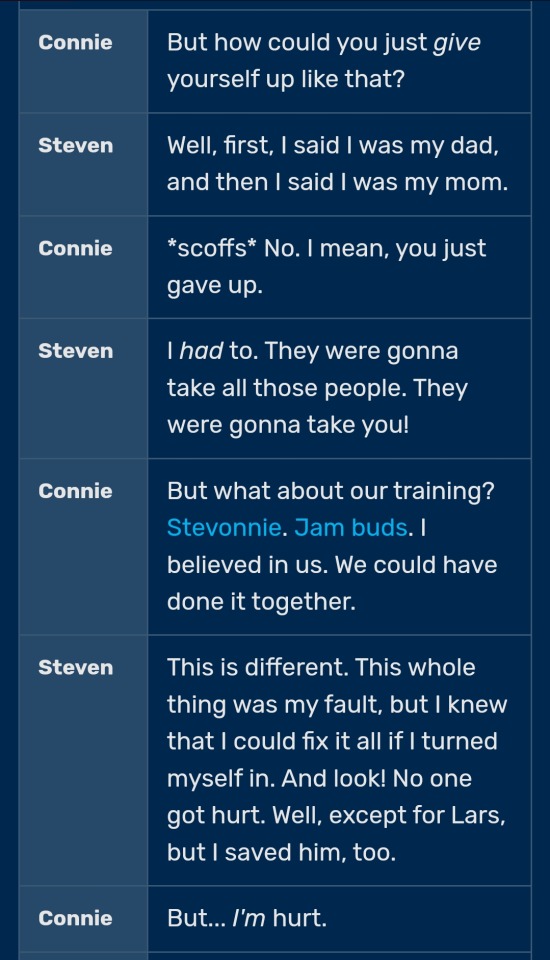
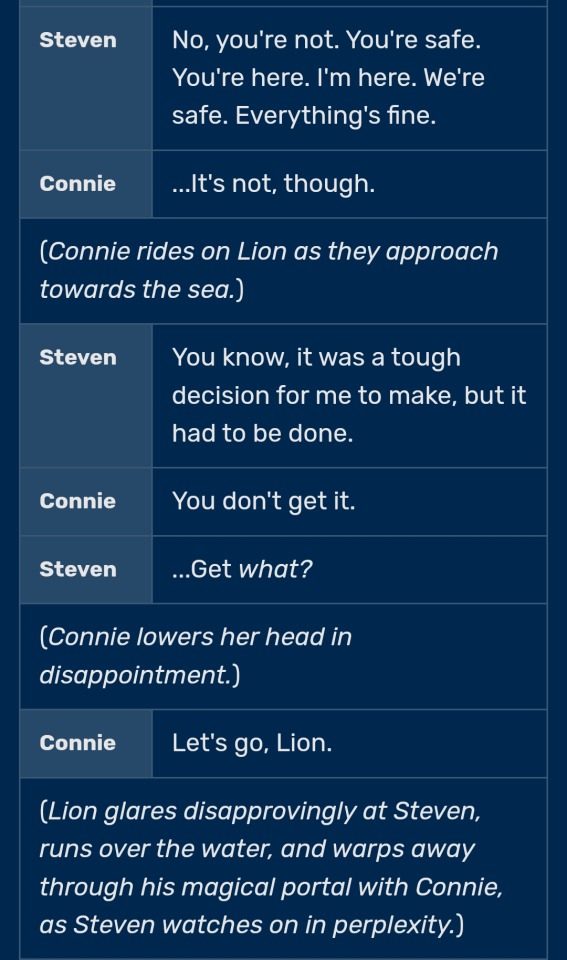
i also think that Steven kinda messed up when he replies to Connie's "i'm hurt" with "no you're not". he decided that as long as no one was physically hurt, there was no problem. he didn't stop to think about how this might have affected Connie emotionally. (i'm not hating on Steven btw, he was in a pretty tough situation himself and was just happy that everyone was safe and alive. this is a situation where both of them were in the right and it was just a complicated issue to navigate.)
basically, Connie deals with this situation more maturely than some adults might have. she felt hurt and betrayed, but she didn't use that as an excuse to hurt Steven. she said what she wanted to say and then she left to give her mind some clarity.
also she does this AFTER Steven returns home safely.
Catra, on the other hand?
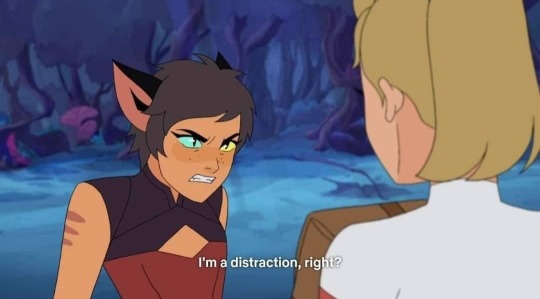
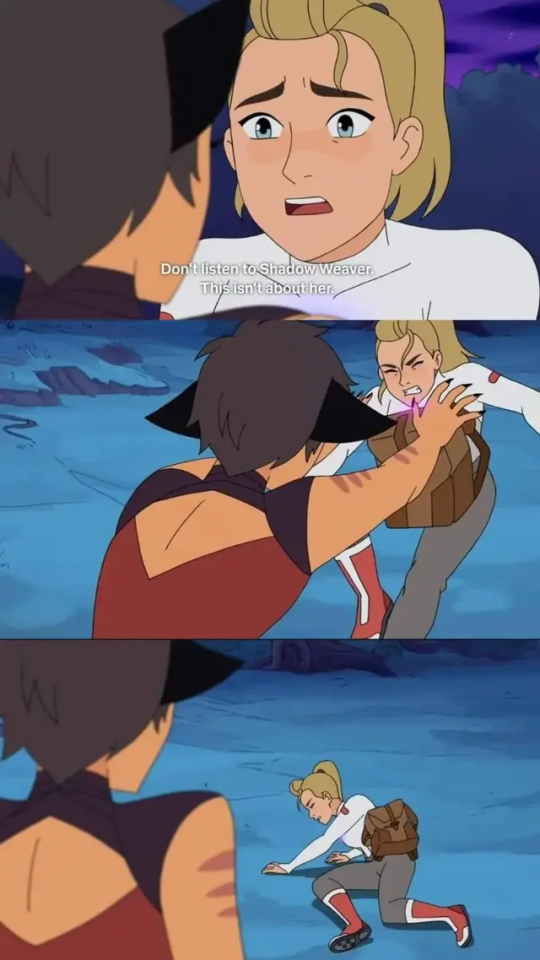
she screams at Adora, accuses Adora of picking favorites and pushes her to the ground. Catra is supposedly in her 20s at this point, and she still hasn't learned to express her anger in a healthy manner. she says once that she was working on her anger issues and that's it. we never see her try, we never see any improvement.
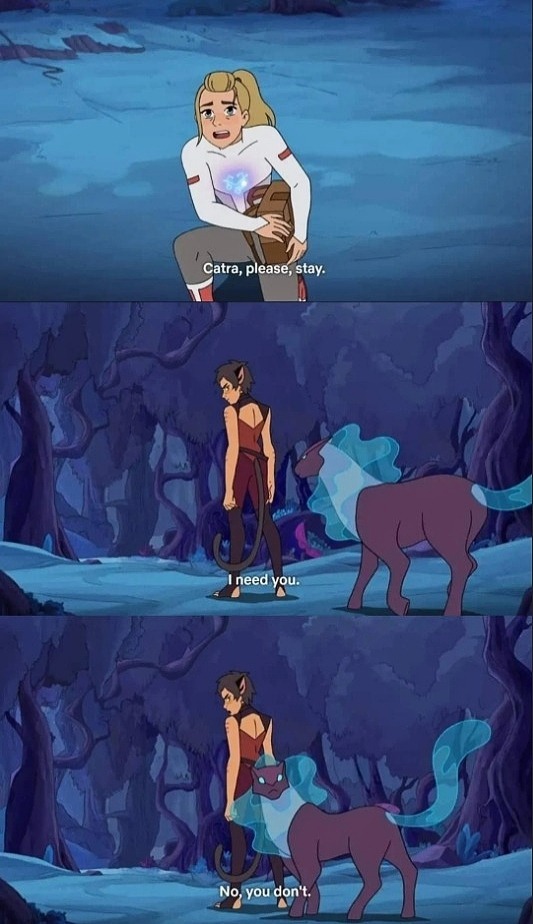
and then Catra just abandons Adora because “she couldn't bear to watch Adora sacrifice herself”. Catra didn't just leave because she needed some time to cool off, she was basically willing to abandon Adora and let her die.
3. Clear Motives
Connie's feelings and motives are clear from the get-go. she was worried about Steven putting himself in danger, and she was angry and upset that he broke their promise and her trust.
Catra though?
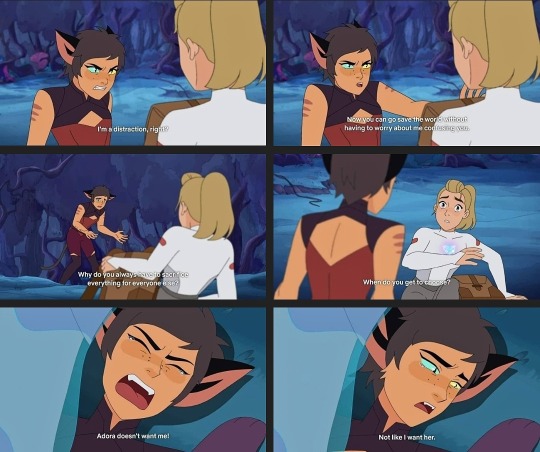
first she's mad that Shadow Weaver called her a distraction. then she's concerned about Adora's choice to sacrifice herself. and finally, she's upset that Adora doesn't like her in a romantic way.
two of these were very self-centered motives. it's hard to believe that Catra was just concerned about Adora's safety when she's whining about how Adora chose Shadow Weaver over her, as if this was some kind of competition. and it just comes off as the writers shoving in as many reasons as possible for the viewers to sympathize with Catra, rather than writing an organic conflict.
in conclusion, if you want to write a relationship involving a self-sacrificial hero, do it like Steven Universe did. make it make sense instead of shoving in hypocritical conflict.
#spop critical#spop salt#spop#spop discourse#spop criticism#she ra#anti spop#anti catradora#anti c//a#steven universe#connie maheswaran#connverse#long post#analysis
162 notes
·
View notes
Text
I swear I cannot look at many posts or threads about Clair Obscur (or at least not the comments) because so many people are arguing over which is the "good" ending and which is the "bad" ending and which ending is more "ethical and moral" and which isn't and I am just like... my beloveds, not everything is completely black and white and can be easily categorized into these simple all-encompassing labels. I for one find the so-called "good and moral" ending to be absolutely horrifying and hit really close to home in a bad way while I find the "bad, unethical ending" to be also horrifying but in a way that I find interesting and tolerable. Yet, still, I very much see why different people with different life experiences and perspectives appreciate the other one more. That's nuance, babe! Which I think is the whole thing. If you are expecting a game full of unreliable narrators, deeply flawed characters, opposing yet understandable perspectives, and conflicting narratives to suddenly wrap up into very binary and objective "Good" and "Bad" endings then I am afraid you have greatly misunderstood both the game and the endings as well as the general intent of the story.
Both of the endings are as good or as awful as you make them out to be. Someone always wins and someone always loses and whichever one you find more palatable is entirely up to your own observations through the lens of your personal experiences. I don't get these arguments and shaming because there is IS no objective "correct" answer and to say otherwise is missing the point big time.
#'I heard Maelle pisses on the poor!!!' type discourse in this fandom 💀#clair obscur spoilers#expedition 33 spoilers#clair obscur expedition 33 spoilers#i have found some absolutely fabulous meta and analysis for this game so far don't get me wrong! but this is just a growing pet peeve for m#jun rambles#jun rants#fandom critical#EDIT: For those who didn't see my other post I made alongside this:#this is specifically a rant about annoying people on Reddit and youtube comments who get really vicious when people#have an even slightly different interpretation or opinion than them#it was looking at reddit comments that inspired me to make this post and the other one
37 notes
·
View notes